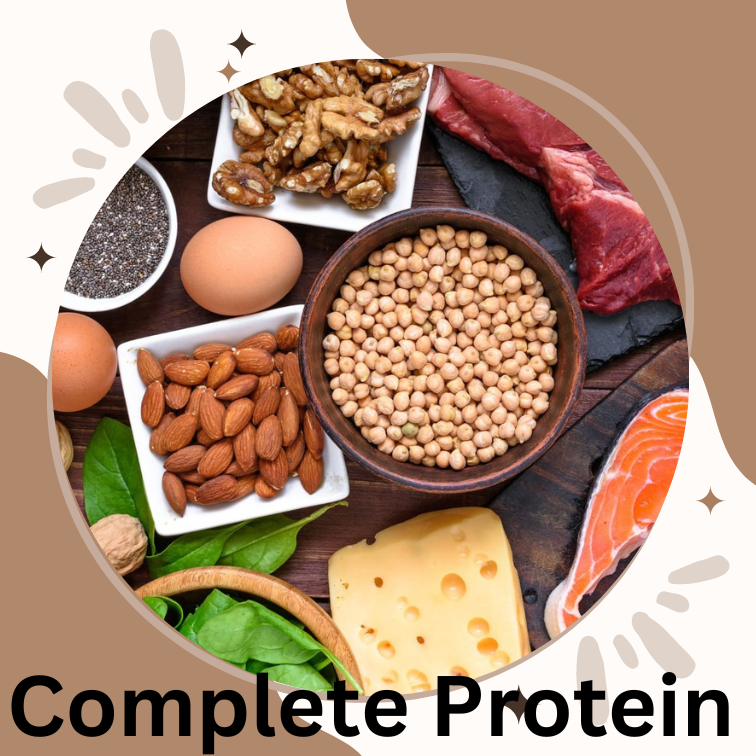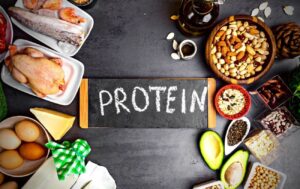Complete protein contains all essential amino acids the body requires for proper function. It is typically found in animal sources such as meat, fish, dairy, and eggs.
Including various foods can ensure you get all the essential amino acids your body needs to thrive. When considering your protein intake, understanding the importance of complete protein is crucial for maintaining overall health and well-being.
This article will provide a comprehensive overview of complete protein, including its benefits and dietary sources. By the end, you will clearly understand how to incorporate complete protein into your diet to support optimal nutrition and overall wellness.
What Is A Complete Protein?
A complete protein is a type of dietary protein containing all nine essential amino acids the human body requires. These amino acids are essential because our bodies cannot produce them independently, so we must obtain them through our diet. Complete proteins are often derived from animal sources such as meat, dairy, and fish. Still, there are also plant-based complete proteins like quinoa and soy.
Definition
A complete protein is defined as a protein that contains all nine essential amino acids in adequate amounts and non-essential amino acids. These amino acids play crucial roles in various bodily functions, such as building and repairing tissues, producing enzymes and hormones, and supporting the immune system.
Characteristics
Complete proteins have distinct characteristics that set them apart from other proteins. These characteristics include:
- Complete Amino Acid Profile: Complete proteins contain all nine essential amino acids in the proper proportions. This makes them an excellent source of protein for promoting muscle growth and development.
- Digestibility: Complete proteins are highly digestible, meaning our bodies can efficiently break them down into individual amino acids and absorb them for use.
- High Biological Value: Complete proteins have a high biological value, providing all the amino acids our bodies need to synthesize new proteins.
- Source Diversity: While animal sources like meat, fish, and dairy are commonly known for being complete proteins, there are also plant-based options available. This allows individuals following vegetarian or vegan diets to obtain complete proteins.
It is important to note that not all proteins are complete. Incomplete proteins, such as those found in grains and legumes, lack one or more essential amino acids. However, combining different incomplete proteins in a meal can still obtain a complete amino acid profile.
Sources Of Complete Proteins
Complete proteins are vital to a balanced diet as they contain all the essential amino acids needed for optimal health. They support muscle growth, repair tissues, and boost overall immunity. Whether you follow a vegetarian, vegan, or omnivorous diet, knowing the best sources of complete proteins is essential.
Animal-based Proteins
Animal-based proteins are often considered complete proteins as they provide an ample amount of all nine essential amino acids required by the body. These proteins come from animal sources such as meat, poultry, fish, eggs, and dairy products. Here are some animal-based sources of complete proteins:
- Lean cuts of beef and pork
- Chicken and turkey breasts
- Salmon, tuna, and other oily fish
- Eggs and egg whites
- Low-fat dairy products like milk, yoghurt, and cottage cheese
These animal-based proteins provide the necessary amino acids and contain essential nutrients like iron, zinc, and vitamin B12. Including various animal-based proteins in your diet can help you meet your protein needs efficiently.
Plant-based Proteins
Contrary to common belief, complete proteins can also be obtained from plant sources. While individual plant foods may lack some essential amino acids, combining different plant-based proteins can create a complete protein profile. Here are some plant-based sources of complete proteins:
- Quinoa
- Buckwheat
- Chia seeds
- Soybeans and soy products like tofu and tempeh
- Lentils and other legumes
- Chickpeas
- Hemp seeds
By incorporating these plant-based proteins into your diet, you can ensure a well-rounded amino acid intake. It is important to note that while plant-based proteins are excellent sources, they may also have additional benefits, like being lower in saturated fats and cholesterol.
Importance Of Complete Proteins
Complete proteins are essential to a well-balanced diet, offering a wide range of health benefits. They provide the body with all the essential amino acids necessary for various bodily functions. Incorporating complete proteins into your meals helps support muscle building and repair and strengthen immune function.
Muscle Building And Repair
Complete proteins play a vital role in muscle building and repair. The amino acids in complete proteins are the building blocks that aid muscle growth and recovery after physical exertion. Individuals can help maintain muscle mass, promote tissue repair, and facilitate overall muscle health by consuming complete proteins.
Immune Function
Consuming complete proteins is beneficial for immune function due to the role of amino acids in supporting the body’s defence system. A well-maintained immune system is crucial for combating infections and maintaining overall health. Complete proteins contribute to the strength and efficiency of the immune system, thereby aiding in the body’s ability to ward off illnesses and maintain optimal wellness.
Myths And Misconceptions
Many myths and misconceptions exist surrounding the topic of complete proteins, particularly about their sources and compatibility. Understanding the truth behind these misconceptions is essential for making informed dietary choices and maintaining a balanced, nutritious diet.
Complete Proteins Only In Animal Products
One common misconception is that complete proteins can only be obtained from animal products like meat, eggs, and dairy. This belief has led to the misconception that a plant-based diet cannot provide sufficient complete proteins, leading to concerns about protein deficiencies.
However, it is essential to debunk this myth. While animal products are indeed sources of complete proteins, various plant-based foods also contain all the essential amino acids required to form complete proteins, including quinoa, soy, chia seeds, and buckwheat.
Incompatibility Of Plant Proteins
Another prevalent myth is the incompatibility of plant proteins in forming complete proteins. Many believe that consuming multiple plant-based protein sources within the same meal is necessary to ensure the intake of all essential amino acids intake. This misconception has led to confusion regarding the adequacy of plant-based protein sources.
Contrary to this belief, the body can efficiently utilize amino acids from consumed plant proteins throughout the day, even if they are derived from different sources. This means that as long as a varied and balanced diet is maintained, individuals can obtain all the essential amino acids necessary for complete protein formation.
Balancing Amino Acid Intake
When it comes to maintaining a healthy diet, balancing amino acid intake is crucial for supporting optimal bodily functions. Amino acids are the building blocks of protein, and getting the right balance is essential for the body to synthesize complete proteins. Complete proteins contain all nine essential amino acids our bodies cannot produce independently.
Complementary Proteins
For individuals following a vegetarian or vegan diet, it is essential to consider complementary proteins to ensure a complete amino acid profile. Complementary proteins are two or more foods that, when consumed together, provide all the essential amino acids needed for a complete protein source. This combination can compensate for some plant-based proteins’ incomplete amino acid profiles.
Here is a list of complementary protein combinations that can help individuals on vegetarian or vegan diets meet their amino acid needs:
Food Combination Essential Amino Acids Provided
Beans and Rice Methionine from beans and Lysine from rice
Hummus and Whole Wheat Pita Bread Lysine from hummus and Methionine from whole wheat pita bread
Peanut Butter and Whole Grain Bread Lysine from peanut butter and Methionine from whole grain bread
Vegetarian And Vegan Diets
Vegetarian and vegan diets can provide all the amino acids for a balanced protein intake. Individuals can meet their amino acid requirements by incorporating various plant-based protein sources into their diets without consuming animal products.
Here are some excellent sources of plant-based proteins that can provide a complete amino acid profile:
- Quinoa
- Tofu and tempeh
- Chia seeds and hemp seeds
- Buckwheat
- Legumes (such as lentils, chickpeas, and black beans)
These options supply all the essential amino acids and offer additional health benefits, including fibre and other essential vitamins and minerals.
Frequently Asked Questions For Which Of The Following Statements Best Describes Complete Protein
What Is A Complete Protein?
A complete protein is a type of protein that contains all nine essential amino acids in sufficient quantities to support the body’s needs.
Which Foods Contain Complete Proteins?
Foods that contain complete proteins include animal sources such as meat, poultry, fish, eggs, and dairy products. Plant-based sources such as quinoa, soybeans, hemp, and chia seeds are complete proteins.
Why Is Complete Protein Important?
Complete proteins are vital because they provide all the essential amino acids our bodies cannot produce independently. These amino acids are crucial for various bodily functions, including muscle growth and repair, immune function, and hormone production.
Can You Get Enough Protein From Plant-based Sources?
Yes, it is possible to get enough protein from plant-based sources. By incorporating a variety of plant-based proteins into your diet and ensuring you consume a balanced and diverse range of foods, you can meet your protein needs without relying solely on animal sources.
Conclusion
Understanding the concept of complete protein is crucial for maintaining a balanced and healthy diet. Complete proteins play a vital role in muscle repair, immune function and overall growth by providing all the essential amino acids. Whether you obtain complete proteins from animal or plant sources, incorporating them into your meals can help optimize your nutritional intake and support your overall well-being.
Remember, variety is vital, so strive for a diverse range of protein sources to ensure you get all the nutrients your body needs.


